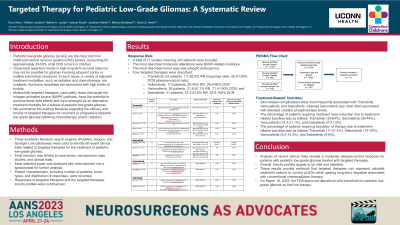Targeted Therapy for Pediatric Low-Grade Gliomas: A Systematic Review
Targeted Therapy for Pediatric Low-grade Gliomas: A Systematic Review
Friday, April 21, 2023


Erica Shen (she/her/hers)
Neurosurgery Resident
University of Connecticut
Farmington, Connecticut, United States
ePoster Presenter(s)
Introduction:
Introduction: Conventional chemotherapy regimens are effective at achieving disease remission among pediatric patients with low-grade gliomas but are associated with significant patient morbidity. Molecularly targeted therapies, particularly those that target the mitogen-activated kinase (MAPK) pathway, have emerged as an alternative treatment modality for a subset of pediatric low-grade gliomas and have the potential to produce fewer side effects. Here, we summarize the existing literature regarding the efficacy and toxicity of targeted therapies for recurrent or progressive pediatric low grade gliomas following chemotherapy and/or radiation.
Methods:
Methods: The PubMed, Scopus, and Springer Link databases were used to identify all clinical trials related to targeted therapy for the treatment of pediatric low-grade gliomas. Case reports and case series were excluded.
Results:
Results: A total of 11 studies involving 232 patients were included. Four targeted therapies were described: Trametinib (52 patients, 28.5-35.7% partial response rate (PR)), Selumetinib (113 patients, 20-36% PR), Vemurafenib (26 patients, 26.3-28.6% PR or better), and Dabrafenib (41 patients, 33.3-43.7% PR or better). Skin-related complications were most frequently described with Trametinib, Vemurafenib, and Dabrafenib, whereas Selumetinib was most often associated with elevated creatine phosphokinase levels.
Conclusion :
Conclusions: Current clinical trials report a variable response rate for patients with pediatric low-grade gliomas treated with targeted therapies. Overall, the toxicity profile appears to be mild and tolerable.
Introduction: Conventional chemotherapy regimens are effective at achieving disease remission among pediatric patients with low-grade gliomas but are associated with significant patient morbidity. Molecularly targeted therapies, particularly those that target the mitogen-activated kinase (MAPK) pathway, have emerged as an alternative treatment modality for a subset of pediatric low-grade gliomas and have the potential to produce fewer side effects. Here, we summarize the existing literature regarding the efficacy and toxicity of targeted therapies for recurrent or progressive pediatric low grade gliomas following chemotherapy and/or radiation.
Methods:
Methods: The PubMed, Scopus, and Springer Link databases were used to identify all clinical trials related to targeted therapy for the treatment of pediatric low-grade gliomas. Case reports and case series were excluded.
Results:
Results: A total of 11 studies involving 232 patients were included. Four targeted therapies were described: Trametinib (52 patients, 28.5-35.7% partial response rate (PR)), Selumetinib (113 patients, 20-36% PR), Vemurafenib (26 patients, 26.3-28.6% PR or better), and Dabrafenib (41 patients, 33.3-43.7% PR or better). Skin-related complications were most frequently described with Trametinib, Vemurafenib, and Dabrafenib, whereas Selumetinib was most often associated with elevated creatine phosphokinase levels.
Conclusion :
Conclusions: Current clinical trials report a variable response rate for patients with pediatric low-grade gliomas treated with targeted therapies. Overall, the toxicity profile appears to be mild and tolerable.
